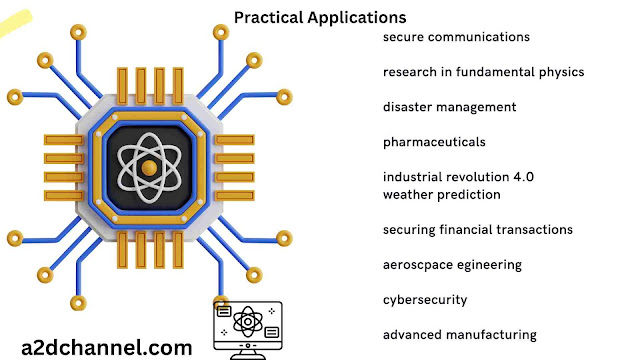What is the definition of quantum theory?
 |
| definition of quantum theory? |
Quantum theory is the theoretical basis of modern physics that explains the behavior of matter and energy at the atomic and subatomic levels. Also known as quantum physics and quantum mechanics, this complex framework challenges our intuitive assumptions about reality and has led to revolutionary technologies like lasers, MRI machines, and quantum computing.
In this in-depth beginner's guide, we'll cover:
- The history and key concepts of quantum theory
- Major interpretations of quantum mechanics
- Practical applications and examples
- Ongoing research and unsolved mysteries
So, buckle up! We're about to dive deep into the very small, very strange world of the quantum.
What is Quantum Theory and Why is it Important?
Quantum theory describes the behavior of energy and matter at scales smaller than atoms. It explains phenomena like radioactivity, quantum entanglement, and quantum tunneling.
Here are some key principles of quantum theory:
- Quantization - Energy and certain physical properties come in discrete units called quanta. Examples are the energy levels of electrons in an atom.
- Wave-particle duality - Subatomic particles like electrons can exhibit properties of both particles and waves. This contradicted previous theories that treated matter and energy as wholly separate.
- Uncertainty principle - It is impossible to simultaneously measure certain pairs of properties like position and momentum to arbitrary precision. Greater precision in one lead to less precision in the other.
- Quantum superposition - Particles exist in multiple states or positions simultaneously until they are measured and "collapse" into a single state. This directly challenges our intuitive concepts of reality.
Without quantum theory, we couldn't explain phenomena like atomic energy levels, radioactive decay, or the flow of electrons in transistors and semiconductors that power all modern electronics. It provides the foundation for many areas of physics and chemistry.
 |
|
A Brief History of Quantum Theory
Quantum theory originated in the early 20th century with a number of pioneering scientists:
- In 1900, Max Planck proposed the idea that energy is "quantized" and comes in discrete units called quanta. This explained blackbody radiation from hot objects.
- In 1905, Albert Einstein theorized that light itself is quantized and consists of particles called photons with discrete energy levels. This explained the photoelectric effect.
- In 1924, Louis de Broglie proposed all matter has an inherent wave-like nature, a phenomenon known as wave-particle duality.
- In 1927, Werner Heisenberg formulated the famous uncertainty principle that challenged the precise measurability of quantum properties.
Together with Niels Bohr, Erwin Schrödinger, Wolfgang Pauli and others, these scientists developed the mathematical framework of quantum mechanics in the 1920s. Their theories were supported by experiments and quantum theory was established as the basis for physics at microscopic scales.
Major Interpretations of Quantum Mechanics
There are different interpretations of the mathematical formalism of quantum theory:
Copenhagen Interpretation
- Pioneered by Niels Bohr and Werner Heisenberg
- Particles don't have defined properties until they are measured and observed.
- Quantum systems exist in a superposition of all possible states before measurement "collapses" this superposition into a single outcome.
Many-Worlds Interpretation
- Championed by physicists like Stephen Hawking and Richard Feynman
- Every possible outcome of a quantum measurement exists in its own "world" or parallel universe.
- There is no wave function collapse - the wave function evolves deterministically over time.
There are several other interpretations like objective collapse theory, quantum logic and more. The debate over interpretations continues today.
 |
| Quantum Computing Practical Applications |
Practical Applications and Examples
Although counterintuitive, quantum theory makes incredibly accurate predictions confirmed by experiments:
- Quantum optics - Lasers, quantum entanglement protocols
- Quantum chemistry - Chemical processes and molecular modeling
- Quantum computing - Using quantum bits or qubits to perform rapid calculations.
- Quantum cryptography - Using quantum states to generate unbreakable codes.
Technologies enabled by quantum physics include transistors, lasers, LEDs, solar cells, MRI machines and more. Quantum theory also allows us to model atomic structure, nuclear processes and intermolecular forces.
Fun Example: Schrödinger's cat thought experiment illustrates superposition. A cat in a box with poison tied to a radioactive atom is considered both alive and dead until observed.
Current Quantum Research and Unsolved Mysteries
There are still unexplained phenomena and unresolved questions about quantum theory:
- Combining quantum theory with general relativity into a "theory of everything"
- The measurement problem - why does measurement collapse superposition?
- Applying quantum effects to larger objects through quantum decoherence theory
- Investigating quantum entanglement and nonlocality - "spooky action at a distance"
- Developing practical quantum computers and quantum machine learning
- Quantum interpretations and the role of the observer
- Quantum biology - quantum effects in biological processes?
Ongoing advances in quantum technology will likely lead to game-changing developments in computing, medicine, energy, transportation and more. There are bound to be discoveries that further illuminate the probabilistic world of the very, very small.
Conclusion
In less than a century, quantum theory has completely reshaped our knowledge of the fundamental workings of the physical world. What was once just speculative is now the foundation underlying all modern science and technology. But many mysteries remain to be uncovered in the quantum realm. With so many revolutionary applications already developed, the future of quantum science looks incredibly bright, if still very strange.